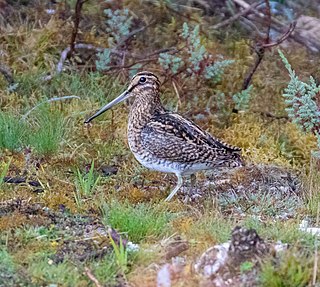
The puna snipe is a bird in tribe Scolopancinai and subfamily Scolopacinae of family Scolopacidae, the sandpipers and relatives. It is found in Argentina, Bolivia, Chile, and Peru.

The white-bellied hummingbird is a species of hummingbird in the "emeralds", tribe Trochilini of subfamily Trochilinae. It is found in Argentina, Bolivia, Brazil, and Peru.

The rufous-breasted sabrewing is a species of hummingbird in the "emeralds", tribe Trochilini of subfamily Trochilinae. It is found in Brazil, Guyana, and Venezuela.

The greenish puffleg is a species of hummingbird in the "brilliants", tribe Heliantheini in subfamily Lesbiinae. It is found in Colombia, Ecuador, Panama, and Peru.
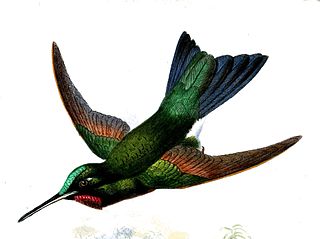
The rufous-webbed brilliant is a species of hummingbird in the "brilliants", tribe Heliantheini in subfamily Lesbiinae. It is endemic to Peru.
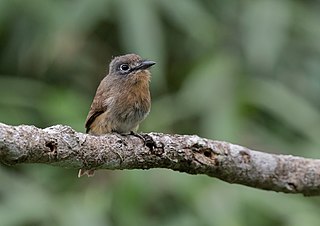
The rusty-breasted nunlet is a species of near-passerine bird in the family Bucconidae, the puffbirds, nunlets, and nunbirds. It is found in Argentina, Brazil, Colombia, Ecuador, Guyana, Paraguay, Peru, Suriname, Venezuela, and possibly French Guiana.

The uniform crake is a species of bird in the subfamily Rallinae of the rail, crake, and coot family Rallidae. It is found in Mexico, most of Central America, and in nine South American countries.

The chestnut-headed crake is a species of bird in subfamily Rallinae of family Rallidae, the rails, gallinules, and coots. It is found in Bolivia, Brazil, Colombia, Ecuador, and Peru.

The black-banded crake is a species of bird in subfamily Rallinae of family Rallidae, the rails, gallinules, and coots. It is found in Brazil, Colombia, Ecuador, and Peru.
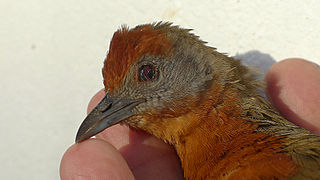
The russet-crowned crake is a species of bird in subfamily Rallinae of family Rallidae, the rails, gallinules, and coots. It is found in Bolivia, Brazil, Colombia, Ecuador, the Guianas, Paraguay, Peru, and Venezuela.

The white-throated crake is a species of bird in subfamily Rallinae of family Rallidae, the rails, gallinules, and coots. It is found in Colombia, Costa Rica, Ecuador, Honduras, Nicaragua, Panama, and Venezuela.

The grey-breasted crake is a species of bird in subfamily Rallinae of family Rallidae, the rails, gallinules, and coots. It is found in Belize, Costa Rica, Guatemala, Honduras, Nicaragua, Panama, Trinidad and Tobago, and every mainland South American country except Chile and Uruguay.

The rusty-flanked crake is a Vulnerable species of bird in subfamily Rallinae of family Rallidae, the rails, gallinules, and coots. It is endemic to Venezuela.

The ash-throated crake is a species of bird in the subfamily Rallinae of the rail, crake, and coot family Rallidae. It is found in every mainland South American country except Chile.

The yellow-breasted crake is a species of bird in subfamily Rallinae of family Rallidae, the rails, gallinules, and coots. It is found on several Caribbean islands and in most of Central America and South America.

The pale-crested woodpecker a species of bird in subfamily Picinae of the woodpecker family Picidae. It is found in Argentina, Bolivia, Brazil, and Paraguay.

The ringed woodpecker is a species of bird in subfamily Picinae of the woodpecker family Picidae. It is found in every mainland South American country except Argentina, Chile, Paraguay, and Uruguay.

The lettered aracari or lettered araçari is a near-passerine bird in the toucan family Ramphastidae. It is found in Bolivia, Brazil, Colombia, Ecuador, and Peru.
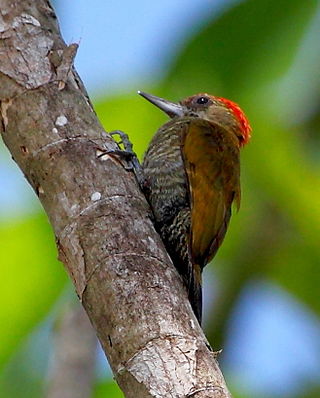
The red-stained woodpecker is a species of bird in subfamily Picinae of the woodpecker family Picidae. It is found in Bolivia, Brazil, Colombia, Ecuador, Peru, and Venezuela.

The copper-tailed hummingbird is a species of hummingbird in the "emeralds", tribe Trochilini of subfamily Trochilinae. It is native to the tepuis of Venezuela and nearby areas of Brazil and Guyana ; it is a vagrant in French Guiana.























